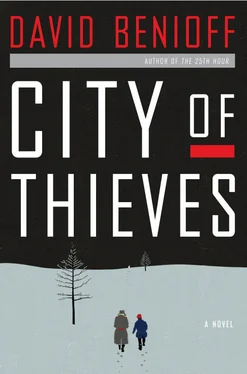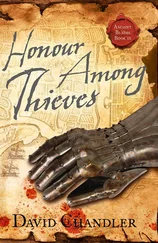When he was finished telling his stories, I questioned him about various details—names, locations, weather conditions on certain days. He tolerated this for a while, but eventually he leaned forward and pressed the Stop button on the tape recorder.
“It was a long time ago,” he said. “I don’t remember what I was wearing. I don’t remember if the sun came out.”
“I just want to make sure I get everything right.”
“You won’t.”
“This is your story. I don’t want to fuck with it.”
“David—”
“A couple of things still don’t make sense to me—”
“David,” he said. “You’re a writer. Make it up.”
You have never been so hungry; you have never been so cold. When we slept, if we slept, we dreamed of the feasts we had carelessly eaten seven months earlier—all that buttered bread, the potato dumplings, the sausages—eaten with disregard, swallowing without tasting, leaving great crumbs on our plates, scraps of fat. In June of 1941, before the Germans came, we thought we were poor. But June seemed like paradise by winter.
At night the wind blew so loud and long it startled you when it stopped; the shutter hinges of the burned-out café on the corner would quit creaking for a few ominous seconds, as if a predator neared and the smaller animals hushed in terror. The shutters themselves had been torn down for firewood in November. There was no more scrap wood in Leningrad. Every wood sign, the slats of the park benches, the floorboards of shattered buildings—all gone and burning in someone’s stove. The pigeons were missing, too, caught and stewed in melted ice from the Neva. No one minded slaughtering pigeons. It was the dogs and cats that caused trouble. You would hear a rumor in October that someone had roasted the family mutt and split it four ways for supper; we’d laugh and shake our heads, not believing it, and also wondering if dog tasted good with enough salt—there was still plenty of salt, even when everything else ran out we had salt. By January the rumors had become plain fact. No one but the best connected could still feed a pet, so the pets fed us.
There were two theories on the fat versus the thin. Some said those who were fat before the war stood a better chance of survival: a week without food would not transform a plump man into a skeleton. Others said skinny people were more accustomed to eating little and could better handle the shock of starvation. I stood in the latter camp, purely out of self-interest. I was a runt from birth. Big nosed, black haired, skin scribbled with acne—let’s admit I was no girl’s idea of a catch. But war made me more attractive. Others dwindled as the ration cards were cut and cut again, halving those who looked like circus strongmen before the invasion. I had no muscle to lose. Like the shrews that kept scavenging while the dinosaurs toppled around them, I was built for deprivation.
On New Year’s Eve I sat on the rooftop of the Kirov, the apartment building where I’d lived since I was five (though it had no name until ’34, when Kirov was shot and half the city was named after him), watching the fat gray antiaircraft blimps swarm under the clouds, waiting for the bombers. That time of year the sun lingers in the sky for only six hours, scurrying from horizon to horizon as if spooked. Every night four of us would sit on the roof for a three-hour shift, armed with sand pails, iron tongs, and shovels, bundled in all the shirts and sweaters and coats we could find, watching the skies. We were the firefighters. The Germans had decided rushing the city would be too costly, so instead they encircled us, intending to starve us out, bomb us out, burn us out.
Before the war began eleven hundred people lived in the Kirov. By New Year’s Eve the number was closer to four hundred. Most of the small children were evacuated before the Germans closed the circle in September. My mother and little sister, Taisya, went to Vyazma to stay with my uncle. The night before they left I fought with my mother, the only fight we’d ever had—or, more precisely, the only time I ever fought back. She wanted me to go with them, of course, far away from the invaders, deep into the heart of the country where the bombers couldn’t find us. But I wasn’t leaving Piter. I was a man, I would defend my city, I would be a Nevsky for the twentieth century. Perhaps I wasn’t quite this ridiculous. I had a real argument: if every able-bodied soul fled, Leningrad would fall to the Fascists. And without Leningrad, without the City of Workers building tanks and rifles for the Red Army, what chance did Russia have?
My mother thought this was a stupid argument. I was barely seventeen. I didn’t weld armor at the Works and I couldn’t enlist in the army for close to a year. The defense of Leningrad had nothing to do with me; I was just another mouth to feed. I ignored these insults.
“I’m a firefighter,” I told her, because it was true, the city council had ordered the creation of ten thousand firefighting units, and I was the proud commander of the Kirov Fifth-Floor Brigade.
My mother wasn’t forty years old, but her hair was already gray. She sat across from me at the kitchen table, holding one of my hands in both of hers. She was a very small woman, barely five feet tall, and I had been afraid of her from birth.
“You are an idiot,” she told me. Maybe this sounds insulting, but my mother always called me “her idiot” and by that point I thought of it as an affectionate nickname. “The city was here before you. It will be here after you. Taisya and I need you.”
She was right. A better son would have gone with her, a better brother. Taisya adored me, jumped on me when I came home from school, read me the silly little poems she wrote as homework to honor martyrs of the revolution, drew caricatures of my big-nosed profile in her notebook. Generally, I wanted to strangle her. I had no desire to tramp across the country with my mother and kid sister. I was seventeen, flooded with a belief in my own heroic destiny. Molotov’s declaration during his radio address on the first day of the war (OUR CAUSE IS JUST! THE ENEMY WILL BE BEATEN! WE SHALL TRIUMPH!) had been printed on thousands of posters and pasted on the city’s walls. I believed in the cause; I would not flee the enemy; I would not miss out on the triumph.
Mother and Taisya left the next morning. They rode a bus part of the way, flagged down army trucks for rides, and walked endless miles on country roads in their split-soled boots. It took them three weeks to get there, but they made it, safe at last. She sent me a letter describing her journey, the terror and fatigue. Maybe she wanted me to feel guilty for abandoning them, and I did, but I also knew it was better with them gone. The great fight was coming and they did not belong on the front. On the seventh of October the Germans took Vyazma and her letters stopped coming.
I’d like to say I missed them when they were gone, and some nights I was lonely, and always I missed my mother’s cooking, but I had fantasized about being on my own since I was little. My favorite folktales featured resourceful orphans who make their way through the dark forest, surviving all perils with clever problem solving, outwitting their enemies, finding their fortune in the midst of their wanderings. I wouldn’t say I was happy—we were all too hungry to be happy—but I believed that here at last was the Meaning. If Leningrad fell, Russia would fall; if Russia fell, Fascism would conquer the world. All of us believed this. I still believe it.
So I was too young for the army but old enough to dig antitank ditches by day and guard the roofs by night. Manning my crew were my friends from the fifth floor—Vera Osipovna, a talented cellist, and the redheaded Antokolsky twins, whose only known talent was an ability to fart in harmony. In the early days of the war we had smoked cigarettes on the roof, posing as soldiers, brave and strong and square-chinned, scanning the skies for the enemy. By the end of December there were no cigarettes in Leningrad, at least none made with tobacco. A few desperate souls crushed fallen leaves, rolled them in paper, and called them Autumn Lights, claiming the right leaves provided a decent smoke, but in the Kirov, far from the nearest standing tree, this was never an option. We spent our spare minutes hunting rats, who must have thought the disappearance of the city’s cats was the answer to all their ancient prayers, until they realized there was nothing left to eat in the garbage.
Читать дальше












